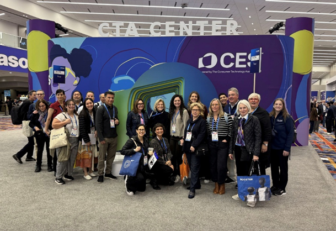By: Peter Kaldes, Presidente y CEO, Next50
Having shaped trade policy in the Obama White House, I never anticipated my expertise would be so critical to my work in aging. Yet, the Republican Administration’s current trade agenda raises a stark question: are they prepared to harm older adults, the nation’s largest voting bloc, through these trade wars?
According to S&P Global, one in five Americans is expected to be 65 years old or older by 2030. This will comprise 20.7% of the population, up from 18.6% in 2025. As America ages, we need to consider how trade policies directly impact the cost of growing older.
High tariffs impact older adults with 401ks who are getting ready to retire. Goldman Sachs warns, “Every five-percentage-point increase in the US tariff rate could reduce S&P 500 earnings per share by 1-2%.” When the stock market has extreme dips, so do 401ks and future retirement plans. Older Americans who may be ready to retire do not have as much time to make up for these tariff-induced losses. The short term-pain that the Administration mentions results in real economic loss for older adults who have spent their careers saving for retirement.
No matter how they get rebranded, tariffs are taxes. Higher taxes mean higher prices. For older Americans living on fixed incomes, those price increases can be devastating. The Kaiser Family Foundation reported that, in 2023, half of all Medicare beneficiaries had incomes below $36,000. Even small price increases can significantly strain these already tight budgets.
Think about what we need as we age – medications, health technology, and other daily necessities. According to the US Census Bureau, these essentials do not come from the United States. They come from overseas. The active ingredients in many medications are imported from China and India. Mobility devices are often imported from Mexico and China. Everyday essentials are brought in from countries across the world.
To understand the real impact of tariffs, let’s consider the $3,000 cost of a power wheelchair. The Administration’s current 145% tariff on Chinese imports would add a whopping $4,350 to that wheelchair’s price, resulting in a total cost of $7,350. For older adults living on limited incomes, that’s not just a number. It’s a crisis. A crisis that could force someone to forgo necessary mobility aids or make an impossible choice about other essential expenses like healthcare, transportation, housing, etc.
We aren’t talking about luxury imports here. We’re talking about critical lifelines and crucial interventions. According to the U.S. Census Bureau, in 2022, 10.9% of adults aged 65 and older lived below the poverty level in the U.S. The National Council on Aging tells us that 80% of older adults are already financially insecure. A substantial price increase caused by tariffs would force millions of older Americans to make difficult financial choices when they are already stretching their budgets.
Some argue that these tariffs will lead to manufacturing everything in America. While the sentiment is understandable, beneficial trade policies are needed. It is complex and costly to build a competitive domestic industry with the necessary infrastructure, trained workforce, and supply chains. It would require billions of dollars in investments that would span years. In the meantime, older adults – our parents, our grandparents, our reliable voters – would pay inflated prices for essential goods for the next many years, and potentially for the remainder of their lives.
So, to my former trade policy colleagues in DC, you know that trade isn’t just about profits – it’s about people. You should also know that the blunt instrument of broad tariffs will inevitably increase the financial strain on older Americans. Instead, leverage your influence and expertise to craft more strategic solutions. If tariffs are being considered, could we phase in tariffs with clear exemptions for essential goods used by older adults? We can implement proactive policies and incentives to bolster American manufacturing of these critical items, not cut these investments entirely.
The cost of growing older in America is already high enough. Let’s not make it even higher through harmful trade policies.




